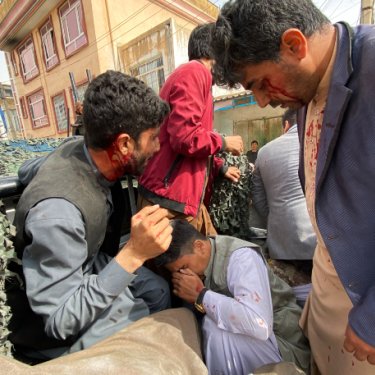Mazar-i-Sharif bombing – “biggest attack” on Afghan journalists in months

After talking to reporters who were at a ceremony to honour media personnel on 11 March in Mazar-i-Sharif, the capital of northern Afghanistan’s Balkh province, when a bomb killed at least two journalists and wounded 15 others, Reporters Without Borders (RSF) calls on the province’s acting governor to bring those responsible to justice.
“It is extremely shocking to see journalists targeted for the sole reason that they are journalists. We call on acting governor Haji Mohammad Yousuf Wafa to identify the perpetrators of this attack without delay so that they can be held to account in court for the sake of justice for the two slain reporters and all the other media workers who were injured.
Three days after the attack, those who were present are still traumatised. “The ceremony started at 10:40 a.m. and the bomb exploded at 10:50 a.m., while children were singing an anthem,” freelance photo-journalist Atif Aryan said.
“When the bomb went off, we all fell to the floor and began scrambling for an exit. But we were in a basement, it was hard to get out, and the security measures were non-existent. We are still in shock.”
Around 100 people were attending the award ceremony to mark “Afghan Journalists Day” in the basement of the Shia Tabyan Cultural Centre when a parcel bomb exploded, killing a security guard instantly and injuring at least 17 journalists, including two who were pronounced dead the next day - Ava Press agency reporter Sayed Hussain Naderi and his assistant, journalism student Akmal Tabian.
Penalised twice over
Islamic State of Iraq and the Levant (ISIL) claimed responsibility for the bombing in a statement published by its propaganda wing, the Amaq News Agency. The attack targeted “journalists working in agencies involved in the war against the Islamic State,” the militant group said.
"This attack was one of a kind and was the biggest attack on our profession in many months,” said Arif Karimi, the head of the media freedom organisation NAI. Karimi also told RSF that journalists who were present at the ceremony were penalised a second time in the form of interrogation by the security forces.
“Security agencies should know that questioning and interrogation is a practice that can be done only according to the laws of the country, “he said. “Journalists should not be considered suspects and questioned at the same time as they are victims.”
RSF has confirmed that the local Taliban authorities confiscated equipment and personal effects from all the journalists present. Three days after the bombing, some of the journalist had still not recovered their cameras.
Warring IS factions
The bomb attack on the journalists came two days after a suicide bombing in Mazar-i-Sharif that killed the governor of Balkh province. It was claimed by Islamic State in Khorasan (IS-K), an Islamic State branch operating in south and central Asia that is an ISIL rival.
As well as suffering as a result of the factional wars between Islamic State militants, Afghan journalists have been among the leading targets of the Taliban since they seized power in Kabul in August 2021.
According to the information obtained by RSF, more than half of the 526 media outlets operating in Afghanistan in the past two decades have had to shut down since the Taliban takeover. The print media are now entirely controlled by the Taliban and near half the radio stations have stopped broadcasting. Of the 30 news sites that Afghanistan had before August 2021, nearly 60% have closed and most have had to move abroad.
